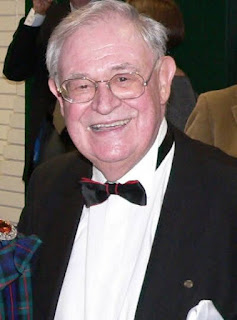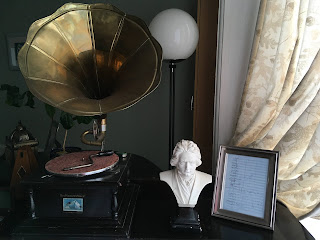In Memoriam Raimund Gilvan (1934 - 2023) - Lyric Tenor
A personal account, not merely an obituary.
On 27th February 1934, Raymond Cartwright was born in Tyldesley, Greater Manchester, to parents of Scottish descendance (Ray - as he was known amongst his friends - would proudly wear his kilt throughout his life). Little is known about his childhood, which would have been affected, without a doubt, by the hardships of daily life in the industrial North of England, and by the bombs and the rationing caused by the Second World War.
Yet already during his time at the Tyldesley Secondary School for Boys, his dramatic and musical talent came to the fore, when frequently singing in performances of Gilbert and Sullivan's light operas, and it was by contraction of these two names - Gilbert & Sullivan - that his artistic pseudonym Raimund Gilvan was conceived.
 |
| Raimund Gilvan - credit: Archiv HfM Saar |
Yet Ray was to develop multiple instrumental and musical skills, when playing the piano, organ and his beloved trombone, as well as composing music of various genres. Far too young to have seen active service during the war, Ray was later sent to be stationed for his military service in the British occupied western territories of Germany, where he played the trombone in the military band of his regiment.
After his service, Ray took a decision that would change his life for good: he was not to return to live in England, but remained in Germany where he straight away took the opportunity to study at the College of Music in Cologne, training as a tenor in the class of the renowned Prof. Ellen Bosenius. Although he returned briefly to London to take his exams at both the RCM and the RAM, he secured his first appointment as a lyric tenor at the State Theatre (opera house) in Mainz from 1961 until 1963, followed by his tenure at the Nationaltheater (National Theatre) Mannheim until 1974.1
Although occasional returning for guest performances at Mannheim thereafter, Ray established his reputation as a concert singer for oratorio and Lied, which is well documented in a number of recordings featuring Bach's cantatas as well as romantic songs, often with his long-time accompanists, Frederic Capon.2
 |
| Raimund Gilvan - album cover |
In 1974 he was offered the position of professor at the Hochschule für Musik Saar (then the Musikhochschule des Saarlands, i.e. College of Music of the Saarland), a post he retained until his retirement in 1999, and where he taught generations of aspiring singers the technical and musical aspects of this art. He soon became firmly established in the musical scene of the city and surrounding counties, giving many recitals and being present at many a cultural event or concert. Having always possessed a keen liking for the lighter genre, he created the "Gilvan Singers" with four of the students from the Saarbrücken college, whose artistic director and piano accompanist he would be combined. The group became a great success and toured the region in many performances.
I have never been a student of Ray's, as I studied the piano instead with Prof. Bernd Glemser, however, I have always considered Gilvan as one of my most influential musical mentors: it was he who introduced me first to the beautiful music of his British Isles - having previously grown up on the German staple of the Three B's (Bach, Beethoven, Brahms), he had recorded a cassette tape for me containing Vaughan Williams' 3rd & 8th Symphonies, and I was hooked ever since!3 In addition, I got to know the poetic playing of French pianist Samson François and the splendid conducting of "Glorious John" Barbirolli (whom Ray remembered from his own days of youth at Manchester's Free Trade Hall).
Ray was an extremely generous person, who was never shy to bring someone a gift or a good bottle of wine: A set of crystal glasses and a wine thermometer he gave me many years ago are still being used today. To celebrate my exam at the Music College he insisted in dining out at one of Saarbrucken's finest restaurants. When his eyesight began to trouble him, he gave me a collection of Eulenburg study scores, as the print of those was too small for him to read.
One day, after I had just bought an old HMV Gramophone at the local flea market, Ray turned up at my flat with a bundle of old shellack records by the "Lancashire Caruso" Tom Burke, another of those introductions of hitherto little known musical treasures Ray bestowed on me, and we took great pleasure in playing those discs and enjoying their original sound on my gramophone. He insisted that I should keep the records which I still have in my collection today.
 |
| My HMV gramophone |
On the occasion of the 1995 - then biennial - music festival "Musikfestpiele Saar", which that year was themed "British Music", we attended together many fantastic concerts, featuring artists such as Richard Hickox, The King's Singers, Tallis Scholars, Catherine Bott, Emma Kirkby, Lynn Harrell, the Royal Liverpool Philharmonic Orchestra, the City of Birmingham Orchestra, and with works by Elgar, Vaughan Williams, Purcell, Holst, Tippett, Britten and many more. The festival ended with a proper "Last Night of the Proms", including Union Jacks, streamers and Pomp and Circumstance.4
I recall our encounter then with the late Sir Michael Tippett after the performance of his "A Child of Our Time" - perfectly attired in a colourful suit only to be matched by Michael Portillo's outfits - when Ray informed him that the local newspaper had wrongly announced the presence of the composer Holst (The Planets were given at the same concert), much to Sir Michael's enjoyment.
Ray was a fantastic chef and connoisseur of good wines, and loved to invite us over to his apartment for long dinners (where we were often joined by our mutual friend, the violinist Nicolai von Dellingshausen), during which we sat together, ate, drank and talked and listened to music until late into the night (being sometimes quite drunk in the end!). On other occasions we would join him for festivities at his local Lodge, often to play some music there during or after the meals.
There are far too many happy memories of my time with Ray in Saarbrücken and surroundings to mention all. It is with great sadness and regret that, after my departure from there in 1996/97, when I started travelling the world (although I eventually settled down in Blackpool), I lost all contact with Ray - but mind you: in those days none of us owned a mobile phone, nor had any social media accounts, not even an email address, which made staying in touch much more difficult compared with today, especially from abroad. However, it was via one of my social media accounts that earlier this year - to my great surprise and delight - I received a message from Ray, passed on by his friend who had come across a video of Ray's songs I previously posted on YouTube. I was pleased to hear that Ray was doing well and enjoying a cruise, as he was looking forward to his 90th birthday the following spring, to which I intended to eventually visit him in person once again, after all those years - but, alas, this was not going to happen.
Raimund Gilvan passed away on 29th August this year aged 89 - and to summarize in the words of his life-long friend Andrew Beaizley, organist at St. Mary's in Brighton: "Ray's death is of course sad, but numerous friends and colleagues will be celebrating his life, which can only be described as glorious - and a life which he enjoyed to the full, right up to the end. [...] I'm proud to share the privilege of having known him as a fellow-musician - of supreme distinction - and as a very dear friend."
Blackpool, in the autumn 2023


Comments
Post a Comment